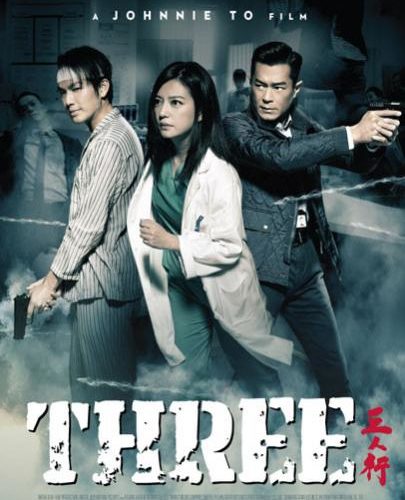With over fifty films to his name ranging from crime epics to romantic melodramas to anti-capitalist musicals, prolific Hong Kong auteur Johnnie To has long had a reputation for unpredictability. Three, his latest film, appears to be a return to his favorite theme of cops and robbers, but, true to To’s eccentric sensibilities it’s much more about the setting of a hospital and a suffering doctor than a prevailing interest in the main conflict.
The director is clear about his emotional crux from the first shot as the camera zooms in through an operating room window and fluidly pans around a frazzled doctor (Wei Zhao) performing brain surgery. A subsequent conversation with her superiors underlines the extent of this doctor’s stress, but To’s camerawork is perfectly fluent in communicating fraying nerves, panning slowly as her hand slightly shakes and, as she pushes forward in vain, the doctors around her suggest opposing advice.
She’s buckling under the pressure and considers leaving for the day, but she can’t do so easily. She has a date with fate in the form of a classically elegant situation of a bank robber in a coma (Drug War’s Wallace Chung) and his attending police officer (regular To collaborator Louis Koo). Time is not on the police officer’s side as he wonders when his perp’s cronies will attempt to rob another bank or bust him out.

Chained to his hospital bed by the officer and urged by the doctor to accept elective surgery for the bullet lodged in his brain, the robber is immediately a problem. He wastes no time being antagonistic, riling up fellow patients in the room — including a comic-relief patient with a concussion and a penchant for stealing keys, a man with a potentially paralyzing spine injury, and another man who clings to his laptop like a security blanket — and pitting the police officers and doctors against each other with his encyclopedic knowledge of both doctors’ arcana like the “hippocratic oath” and the fine print of police procedure.
That’s about the extent of the set-up, but To knows exactly how to take advantage of both the location’s architecture, and specifically the intimate space. Even before the film moves toward anything resembling conventional thriller territory, To’s impeccable control of visual grammar internalizes the geometry of each space, elevating even familiar actions like walking through a door into a nearly endless source of suspense. Each wall becomes presented as areas of alternating safety and danger.
The formal command is further amplified by the director’s ability to enter into a character’s head. The doctor is a particular highlight, as she offers a welcome change from the usual perspectives of law enforcement and criminals. She may be prioritizing the robber because of his head injury, but she’s always thinking about the other patients in the room and how this situation interferes with her regular protocol.

The doctor is generally the major vantage point for understanding this situation. There’s a constant awareness that something could go wrong, whether it’s through characters constantly scanning dozens of computer screens for a person of interest or a canny sequence where one officer searches for someone in relation to “Ode to Joy.”
The script doesn’t always hit with the same force as the visual work, but, through committed performances and direction, both the principal and secondary characters feel purposeful. In the same way the director infused so much character into down moments like the game of paper soccer in The Mission, the build-up of Three never feels like bloat or a stalling mechanism.
And after an hour of slow burn simmer, Three culminates in a six-minute set piece that’s among the most memorable action scenes of the year. Filled with To’s natural knack for staging and blocking, it’s a scene of vicious beauty, but also a nightmarish scenario when seen through the viewpoint of a doctor. Through simply a different perspective, it’s a reconsideration of John Woo-style gun battles as something grounded in the real, and reflective of consequences.
Three is now in limited release.

